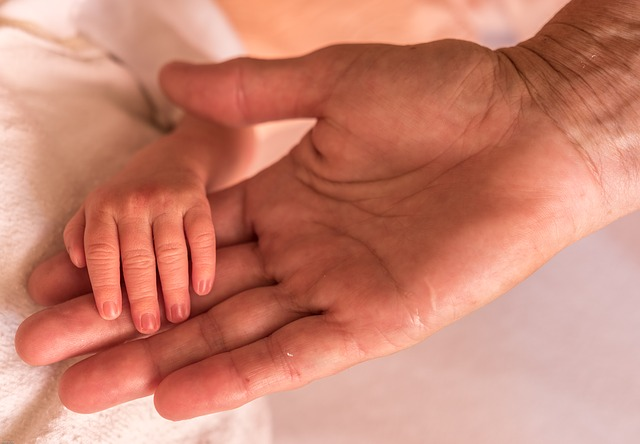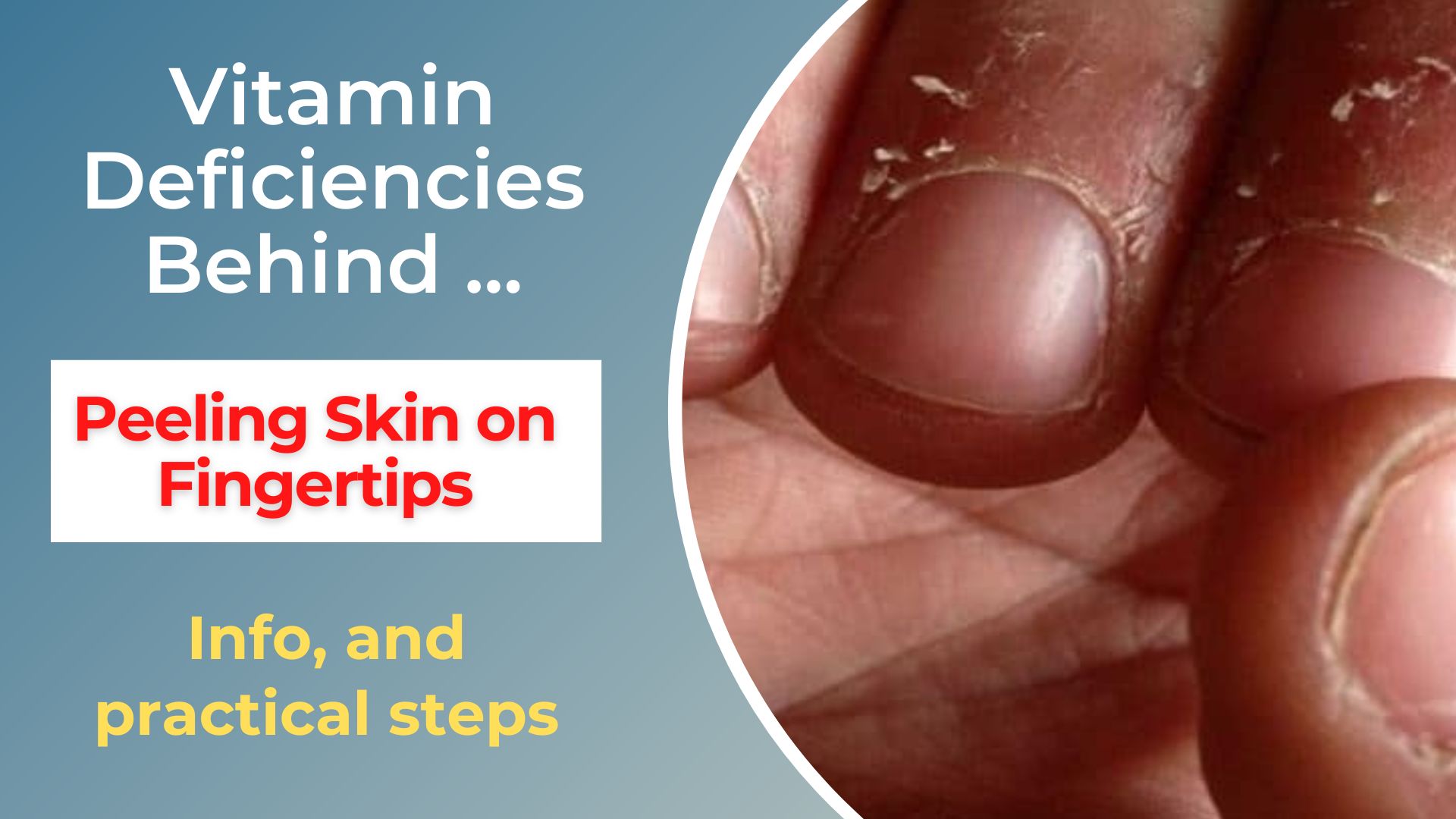Do your fingers peel often? Split skin on fingers vitamin deficiency is very common.
It’s likely not a cause for alarm, as there are many common reasons skin can peel on the fingers.
- Environment – Environmental factors can cause skin on top of fingers peeling such as frequent hand-washing.
- Vitamin deficiency – Peeling cracked or dry skin can also be a sign of dehydration or a vitamin deficiency.
If your fingers are peeling because of factors of environment, in cold weather, for example, the best tip is using lotion, and washing your hands frequently with hot soap and water.
But what if a vitamin deficiency is causing your skin to peel? What can you do then?
In this blog post, we will explore the various causes of finger peeling, as well as potential treatments and prevention methods.
As a public health announcement, you should know that several vitamin deficiencies can contribute to finger peeling.
Fortunately, there are great vitamin blends and supplements to help your fingers get the collagen & biotin they need for lasting skin health!

What causes the skin to peel?
First, let’s talk about why skin peels. Peeling skin results from the loss of the outermost layer of skin cells.
The process of losing dead skin cells and growing new ones is called exfoliation, and it happens all over our bodies every day.
You may have noticed that your skin feels softer after you’ve been in the sun, or that your skin peels after a sunburn.
This is because exposure to UV light speeds up the exfoliation process.
Other factors, can also cause peeling skin such as:
– Environmental irritants: Peeling skin on the fingers is often caused by environmental factors, such as cold weather or frequent hand-washing.
– Dehydration: Peeling skin can also be a sign of dehydration. When the skin is dry, it is more likely to peel.
– Vitamin deficiency: Peeling skin on the fingers can also be caused by a vitamin deficiency. Vitamins A, C, and E are important for healthy skin.
– Medications: Peeling skin on the fingers is also a common side effect of certain medications, such as retinoids.
While peeling skin is usually not a cause for concern, there are some situations when you should see a doctor. In the end, we’ll look at when you should visit a doctor.
Lifestyle changes, such as those listed below, can help prevent peeling skin on the fingers.
– Use a humidifier: A humidifier can help add moisture to the air and prevent the skin from drying out.
– Wear gloves: Wearing gloves when you are outdoors or cleaning can help protect your hands from environmental irritants.
– Limit hand-washing: Frequent hand-washing can dry out the skin. Whenever possible, limit hand-washing to once per day.
– Eat a healthy diet: Eating a diet that is rich in vitamins and minerals can help prevent vitamin deficiencies.
– Drink plenty of fluids: Drinking fluids helps keep the skin hydrated and prevents dehydration.
Niacin deficiency
Niacin is an essential vitamin that helps the body convert food into energy. We also know it as vitamin B₃.
Niacin deficiency can cause several problems, including peeling skin on the fingers.
A diet lacking in niacin-rich foods, such as meat, poultry, fish, and nuts, can cause a niacin deficiency.
Certain medical conditions, such as Crohn’s disease or pellagra can also cause A niacin deficiency.
According to some limited science, peeling skin is just one symptom of niacin deficiency.
Skin cracks , redness, and inflammation can also occur.
Other symptoms include:
– Fatigue
– Headache
– Diarrhea
– Dizziness
– Depression
Niacin deficiency can be addressed through supplements or by incorporating niacin-rich foods into your diet. We will discuss some of these supplements later on. For example, you may consider trying “Vital Recharge,” a supplement from Gundry MD that includes niacin, known for improving skin and providing additional health benefits. Explore Vital Recharge reviews to understand how it may meet your specific needs.
These symptoms are common to a lot of deficiencies and so it’s important to see a doctor if you think you may be deficient in niacin.
Niacin deficiency can be treated with supplements or by eating foods that are rich in niacin. We’ll cover some of these supplements later on.
Biotin Deficiency

Biotin is a water-soluble vitamin that is part of the B-vitamin family. It helps the body metabolize fats and carbohydrates.
Biotin deficiency can lead to a slew of issues, including peeling skin on the fingertips.
A diet lacking in biotin-rich foods, such as eggs, nuts, and legumes, can cause a biotin deficiency.
A biotin deficiency can also be caused by certain medical conditions, such as Crohn’s disease or pregnancy.
Other symptoms include:
– Brittle nails
– Dry skin
– Hair loss
– Fatigue
– Depression
Vitamin A Overdose
Vitamin A is a fat-soluble vitamin that is essential for vision, bone growth, and reproduction.
Sensitive skin is a common side effect of vitamin A overdose.
While vitamin A is necessary for good health, too much vitamin A can be toxic.
It’s important to get enough vitamin A, but you should be careful not to overdo it. It’s common to get too much vitamin A from supplements.
Peeling skin on the fingers is a common symptom of vitamin A toxicity.
Make sure you are not taking more than the recommended daily allowance of vitamin A.
The recommended daily allowance for adults is 700 micrograms, more than that may lead to peeling skin and other health problems.
Vitamin Imbalance
Several vitamins are essential for healthy skin. When one or more of these vitamins is lacking, it can lead to peeling skin on the fingers.
Some common causes of vitamin imbalance include:
– Poor diet
– Certain medical conditions
– Medications
Niacin ensures that your cells can convert food into energy. It also plays a role in DNA repair.
Vitamin c deficiency also plays a vital role.
Biotin is necessary for the metabolism of fats and carbohydrates. It’s also important for healthy skin, nails, and hair.
An imbalance in either of these vitamins can lead to peeling skin on the fingers. To prevent this, it’s important to eat a balanced diet and take supplements if necessary.
Certain medical conditions, such as Crohn’s disease, can also lead to vitamin imbalance.
In summary, Vitamin A is the main deficiency responsible for peeling skin on finger tips. However, you might also be lacking biotin or niacin.
Treatment for peeling skin
So now that we know some causes of peeling skin on the fingers, let’s talk about treatment.
One suggestion is to avoid using hot water and harsh soaps since these may strip your skin of its natural oils and cause it to become dry and flaky.
To prevent this, use lukewarm water and mild soaps.
It’s first important to know that peeling skin is not usually a serious condition and will often go away on its own.
It’s an uncommon condition that happens when skin cells are damaged and begin to form scars, which can be prevented by simple hygiene measures such as frequently washing hands and using hand lotion.
That being said, there are several things you can do to speed up the healing process and prevent peeling skin in the future.
When to visit the doctor
Peeling skin is usually not a cause for concern.
However, if you experience any of the following, especially when taking a supplement, you should visit your doctor:
– Peeling skin that covers over one-third of your body
– Peeling skin that is accompanied by a fever
– Peeling skin that is accompanied by shortness of breath
– Peeling skin that is accompanied by dizziness
– Peeling skin that is accompanied by chest pain
Treatment for peeling skin usually isn’t necessary.
However, if your peeling skin is caused by an underlying condition, such as Crohn’s disease, other treatment will be necessary.
Supplements & Foods
I’ve written an in-depth article about the significance of supplements in various vitamin deficiencies. So, first I’d want you to read this here.
It would give you a basic understanding of supplements and why they are used. It’s like taking a little supplement and vitamin course downtown.
You should also take foods that are high in biotin and niacin. These include:
– Eggs
– Salmon
– Avocado
– Nuts
– Seeds
You should look at the best supplements for Vitamin A for vitamin A if you think you’re lacking in either of these vitamins.
Summary – peeling skin on fingertips vitamin deficiency
Although peeling dry skin may seem like a minor issue, it can be a sign of something more serious.
By understanding the different causes of dry skin peeling and how to treat them, you can help keep your skin healthy and looking its best.
As we discussed, peeling skin can be caused by several things, including vitamin deficiency, poor diet, and certain medical conditions.
If you’re experiencing peeling skin, try eating foods that are high in biotin and niacin or taking supplements.
It’s also possible that your peeling skin is caused by your immune system. Peeling skin can be a symptom of autoimmune diseases, such as lupus and psoriasis.
If you think your peeling skin may be caused by an autoimmune disease, visit your doctor for a diagnosis.
If different symptoms accompany your peeling skin such as a fever or chest pain, be sure to visit your doctor.
Keep your skin moisturized by using lotion, and avoid hot water and harsh soaps.
Have you ever experienced skin peeling? What was the cause?
Do you have any tips for preventing or treating peeling skin? Let’s share in the comments!



